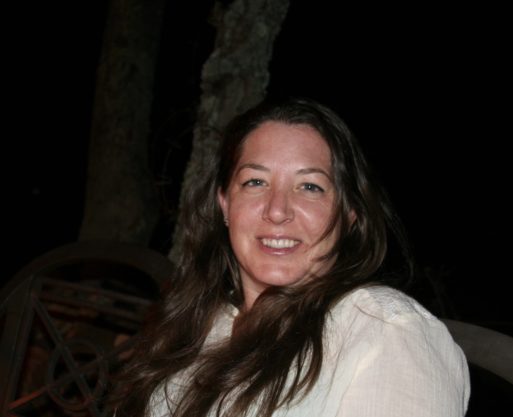
Julia has been helping to comfort hospice patients for over 10 years.
Human touch is vital. There are libraries of information about the importance of maintaining touch with humans in the early stages of their lives. But what about the late stages of their lives?
Julia Gandy believes it’s just as important.
She’s been practicing hospice massage for over a decade. While attending massage school, she had an experience with a loved one at the end of their life that planted a seed in her mind.
She described the experiences she had that guided her into the field of hospice massage:
“My older second cousin was dying of pancreatic cancer. I remember sitting around his bed with all of the cousins and daughter saying ‘I should be able to do something.’ I just wanted to provide comfort, whether it was to massage his feet or hands. Just to provide that comforting touch.”
Then shortly after that, I didn’t know it was my grandfather’s last day. He was in the hospital. I fed him dinner and gave him a foot massage, and that was the last time I saw him. And that was when I realized this was really what I want to do.”
She’s now a board-certified massage therapist and she’s been a member of the Associated Massage and Bodywork Professionals for over 15 years. She sat down with SevenPonds to discuss the world of hospice massage.
Editor’s Note: This interview has been edited for length and clarity.
How does a hospice massage differ from a normal massage?
It’s not like I bring a massage table and flip them around. That’s the furthest thing from what I do. I meet them where they’re at. I don’t take off any clothing. Everything is over the clothing. I only use their oils or lotions because a lot of people have skin sensitivities. I don’t want to introduce anything that could cause irritation. Whether they’re in a hospital bed or a wheelchair, that’s where I do the massage. Sometimes it’s five minutes, sometimes it’s 30 minutes. It’s always changing depending on the needs of the patient. I have to be very fluid and flexible in regard to outcomes. I can’t go in with a set plan that’s the same for each patient.
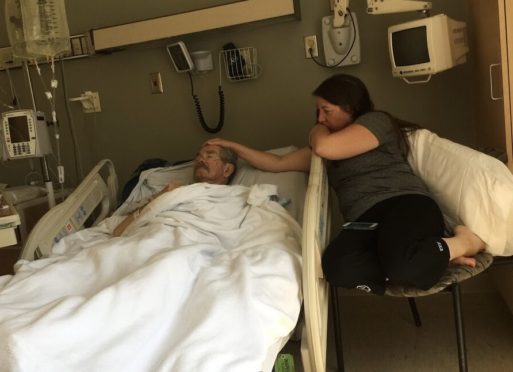
Gandy comforts her father during the end of his life.
What type of feedback have you gotten from patients?
One thing people can take comfort in is that most people in hospice are not as fragile as we think they are. There are obviously different stages and diseases, but a nice foot massage or a nice back rub can feel really nice. Have you ever gotten sick and stayed in bed for a few days? There’s always that part of the neck, right under the skull that’s sore just from laying down too much. People love a massage there, or a nice hand massage. It provides comfort and touch. A lot of people in this population are touch-deprived. That can lead to loneliness, sadness, or anxiety. That comfort can soothe the soul and the heart.
Do you normally say words that are comforting or is this more of a touch experience?
A lot of people are hard of hearing or may have dementia or some form of brain injury. It’s funny because a lot of our grandparent’s generations were very accommodating, so I tell them that “it’s okay if you fall asleep because that tells me I did a good job.” They want to stay awake and ask me if I’m okay or tell me I’m working too hard. And I have to remind them that I’m there for them.
If they’re very near the end of life, it can be a very sacred time, and sometimes I just like to provide the comfort of telling them they did a good job, their family is okay and they’re going on. And everyone here thanks you for being a great mom or dad or person. I’m just another person telling them that they’re going to be okay. Because it can be scary.
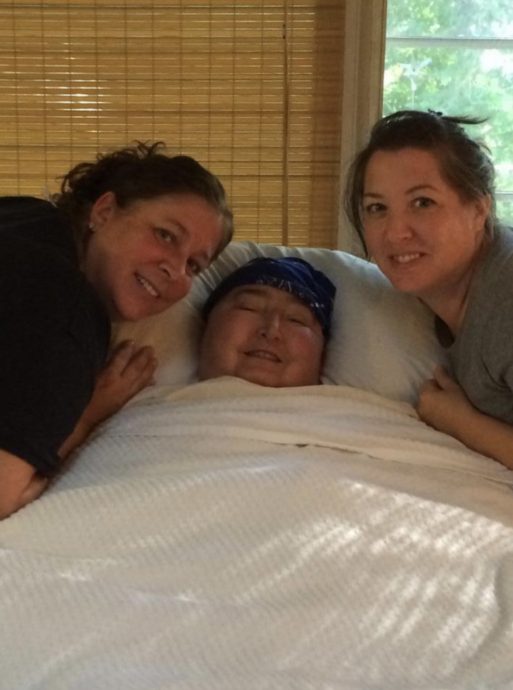
Gandy and her cousin comfort her aunt.
Does your own fear ever arise?
I had to be clear with my own journey about what it means to die. I don’t want to put my sadness or grief or unresolved issues of what it means to die onto my patient. I can connect and feel sadness or grief, but the practitioner needs to have their stuff in order so the family or patient isn’t comforting them.
It’s a normal process. Birth is sacred. Death is sacred. And there are so many beautiful stories that I’ve been a part of or heard of that made me think, “Wow, that’s a really beautiful death.” The more people understand that this is where we’re all going to be one day, the more we can ask questions like, “What do I want that to look like? How do I want to be?” To me, it’s a very sacred time.
Do any stories stick out to you?
Sometimes a patient is “lingering.” They haven’t eaten or drank anything in days, or even been awake. Sometimes they’re a very private person and they don’t want to die in front of anyone. Even though it looks like they’re not responding, there’s still a part of that person that’s still there, that’s picking up on voices in the room.
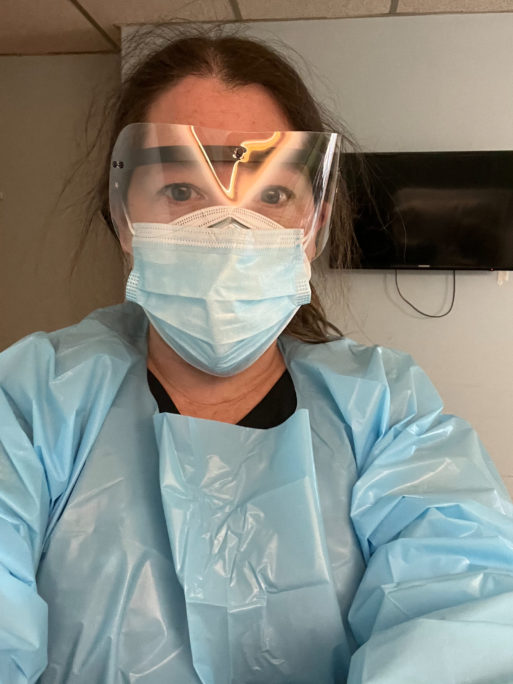
Gandy prepares for a hospice visit during the pandemic.
When my father was passing. He had an unhealed traumatic incident from childhood. Even though he was an atheist for many years, his wife asked for a priest. We told the priest what happened with my father. He’d been holding on to guilt from this event for over 70 years. Now he was unresponsive. Then the priest whispered in his ear that he was forgiven. Before the priest could even stand up, my father passed. He needed to be absolved of the guilt.
In your experience, does it seem like people can choose when to go?
Yes. My aunt had brain cancer and went down very quickly. She was always very musically inclined. And when she was very near the end, the radio station we both liked was doing a top 100 countdown. And as I was driving there, the song “American Pie” came on. So we all stood around her and sang that song. And when the line “and this will be the day that I die” came on, she passed. To me, these are miracles.
What’s your biggest challenge in giving your best quality of care?
Not doing too much. I really have to be conscious of my own energy levels and my ability to give. As a caregiver, I can just give and give, but that can burn me out. So I need to make sure I’m not doing too much.
How can people find a hospice massage practitioner, and what can they do on their own?
As funny as it sounds, I would recommend just YouTubing “hand massage” or getting some nice lotion and rubbing it in as gently as you can. You want to be mindful of skin integrity. You want to employ a nice “feather touch.”
There are also a few different websites to find a practitioner: Associate Bodywork and Massage Professionals, American Massage Therapy Association , and The National Certification Board for Therapeutic Massage & Bodywork. You want to find someone with this training who will come to you.
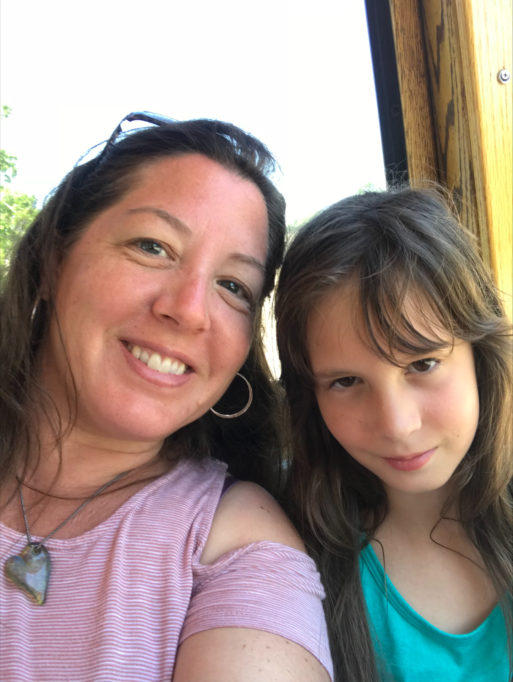
Gandy poses with her daughter.
Do you have any advice for the readers who are going through, or are caring for someone going through, an end-of-life experience?
As a caregiver, it’s really important to take of yourself. One of the main mantras for this is to fill your own cup first and let others drink from the overflow. Know that this is a short time. (Though I had one grandma in hospice for two and a half years.)
Know that you can be doing some of the last things with this person. This could be the last holiday with their loved one. As sad as that can be, how can we make this joyous? How can we make this so we don’t look back at this time and regret it?
To me, hospice is a gift because not only are they coming in to take care of the patient, but the family as well. It’s also the gift of the awareness that we need to make mom the focus so we can look back at this knowing we did as much as we could. It’s a normal time, all of us will be at this point. Have that party for them before they go so they can feel the love they brought into this world.

 Hospice Massage Offers a Touching End to Life
Hospice Massage Offers a Touching End to Life


 “As Tears Go By” by Marianne Faithfull
“As Tears Go By” by Marianne Faithfull
 “The Sea” by John Banville
“The Sea” by John Banville
 Funeral Favors Offer Visitors a Tangible Memento
Funeral Favors Offer Visitors a Tangible Memento















